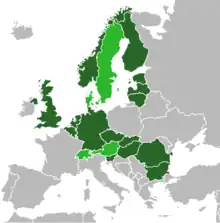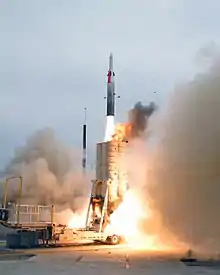European Sky Shield Initiative
European Sky Shield Initiative (ESSI) is a project to build a ground-based integrated European air defense system which includes anti-ballistic missile capability. As of July 2023, nineteen European states participate in the initiative.

Background
The initiative was originally proposed by the Chancellor of Germany Olaf Scholz in August 2022.[1] The proposal was made during the 2022–2023 Russian strikes against Ukrainian infrastructure and amid increased concerns about the limited European capability to defend against such threats as the Russian 9K720 Iskander ballistic missile systems deployed in Kaliningrad.[2][1] In October 2022, fifteen European states (Belgium, Bulgaria, the Czech Republic, Estonia, Finland, Germany, Hungary, Latvia, Lithuania, the Netherlands, Norway, Slovakia, Slovenia, Romania, the United Kingdom) signed a declaration to join the German-led initiative.[3] It would involve joint procurement of the air defense systems.[3] All founding states are also members of NATO (with Finland joining the alliance in 2023), and the initiative also aims to strengthen the NATO Integrated Air Defense System.[4]
In February 2023, Denmark and Sweden joined the project.[5] In July 2023, neutral states Austria and Switzerland signed the declaration to join the initiative, raising questions about the future and practicalities of their policy of neutrality.[6]
France, on the other hand, has been challenging the initiative, citing too much reliance in German plans on equipment and technology produced outside Europe. It was suggested that the French government is dissatisfied that the French-Italian SAMP-T system is excluded from ESSI.[7] In June 2023, France made a counter-proposal and has been calling for other countries to examine the alternatives.[8] As of July 2023, several major European states, namely France, Poland, Italy and Spain did not make a decision to join the ESSI.
Capability

The ESSI will use multi-layered defence, with the following systems planned:[6]
- Medium range: primarily IRIS-T SLM
- Long range: MIM-104 Patriot
- Very long range (exoatmospheric): Arrow 3
In December 2022, the German Chancellor expressed a hope that the system will be developed in the next five years.[9] In June 2023, the German Bundestag authorized nearly €4 billion for the acquisition of Arrow 3 anti-ballistic missile system from Israel.[10]
See also
References
- "Scholz revives vision for German-led air defense network in Europe". Defense News. 29 August 2022. Archived from the original on 14 August 2023. Retrieved 8 July 2023.
- "We have reached a defining moment in our support for Ukraine". European Defence Agency. Archived from the original on 8 July 2023. Retrieved 8 July 2023.
- "Germany, 14 NATO allies agree to procure air defense systems". Deutsche Welle. 13 October 2022. Archived from the original on 5 July 2023. Retrieved 8 July 2023.
- "14 NATO Allies and Finland agree to boost European air defence capabilities". NATO. 13 October 2022. Archived from the original on 26 July 2023. Retrieved 8 July 2023.
- "European Sky Shield Initiative gains two more participants". NATO. 15 February 2023. Archived from the original on 9 July 2023. Retrieved 8 July 2023.
- "Neutral Swiss and Austrians join Europe's Sky Shield defence". BBC News. 7 July 2023. Archived from the original on 7 July 2023. Retrieved 8 July 2023.
- "France summons allies in challenge to German-led air defence plan". Financial Times. 19 June 2023. Archived from the original on 8 July 2023. Retrieved 8 July 2023.
- "France outlines counter-offer to Germany's anti-missile defense project". Le Monde. 19 June 2023. Archived from the original on 8 July 2023. Retrieved 8 July 2023.
- "Germany's Scholz wants air defence shield in next five years - Funke", Reuters, 8 December 2022, archived from the original on 8 July 2023, retrieved 8 July 2023
- "Germany OKs Israeli Air Defense System Procurement". The Defense Post. 15 June 2023. Archived from the original on 8 July 2023. Retrieved 8 July 2023.